Interview: VOFAN, Monogatari Illustrator & "The Magician of Light and Shadow"
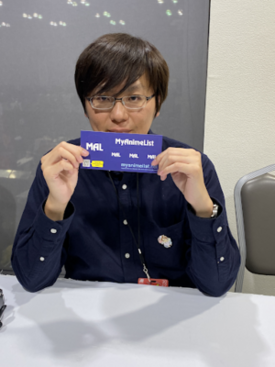 Perhaps best known as the illustrator for NISIOISIN's Monogatari light novel series, Taiwanese artist and photographer VOFAN has been active in the comic and light novel industries since 2002, and his unique visual style has earned him the moniker "The Magician of Light and Shadow" from Japanese fans.
Perhaps best known as the illustrator for NISIOISIN's Monogatari light novel series, Taiwanese artist and photographer VOFAN has been active in the comic and light novel industries since 2002, and his unique visual style has earned him the moniker "The Magician of Light and Shadow" from Japanese fans.Beyond Monogatari, VOFAN has also illustrated for another NISIOISIN series, Boukyaku Tantei. On October 29th, 2019, he published the U.S. version of "Colorful Dreams," a full-color artbook featuring some of his personal works.
In November 2019, VOFAN was a guest of honor at AnimeNYC, and MyAnimeList had the opportunity to join a press conference with the esteemed illustrator.
Your 2006 collection, "Colorful Dreams," was finally released here in America last month. You pulled some brilliant experiences from your life in Taiwan to make the short stories contained within; which one would you say was the most personal to you?
VOFAN: I personally really like the story called "The Jiufen Cafe." In the English translation, it's simply "A Cafe."
Ah, with the two monsters!
VOFAN: Yes! But actually, since this story is viewed through a Taiwanese cultural lens... those two that you referred to as monsters—they're actually deities. Gods.
The story is about how the deities come out to drink coffee, but they don't pay with money. Instead, they'll pay you with good luck.
What were some of the challenges in bringing "Colorful Dreams" to the US, to a new audience?
VOFAN: At first, we thought we only needed to hire a designer to redo the text and layout for "Colorful Dreams"—and that that would give us the U.S. version of the book. Later on, however, I started feeling like some of the illustrations were too old, and I wanted to adjust the characters' faces a bit.
However, while I was adjusting the faces, I found that the backgrounds needed to be adjusted as well. Otherwise, it would look like the characters were superimposed on the backgrounds. I really didn't like that, so I ended up deciding that I would simply redraw everything.
The biggest challenge, though, was how my editor stopped me from doing that, stopped me from redrawing everything. Because if I had proceeded to do so, it likely would've taken more than half a year to finish.
In "Colorful Dreams," you mentioned that you were a fan of Yuzo Takada's work and Yuu Yuu Hakusho in your youth. What about these series was so compelling to you?
VOFAN: Because I've always liked reading Japanese manga, starting from when I was a kid... and because I only read Japanese manga at the time, well, I would learn solely from what I read. For example, I was influenced by Yuu Yuu Hakusho when I was about 13 or 14 years old, and I would draw the characters. And as I came to enjoy other works as time went on, I would learn the art styles and character designs that I saw in those as well.
When I was younger, I would simply imitate what I saw. But later on, around the time I was in college, that changed. When I saw something I really liked, I would try to learn from the essence of the art itself as opposed to trying to emulate the style or execution.
How would you say your style has changed from when you first started illustrating professionally?
VOFAN: The biggest changes to my style... there are two. The first is that there's more of a story element to it now. The second is that I now pay more attention to the lighting. And lighting, the way light and shadows work together, is interrelated with photography. And so I feel that photography has had a big effect on my work.
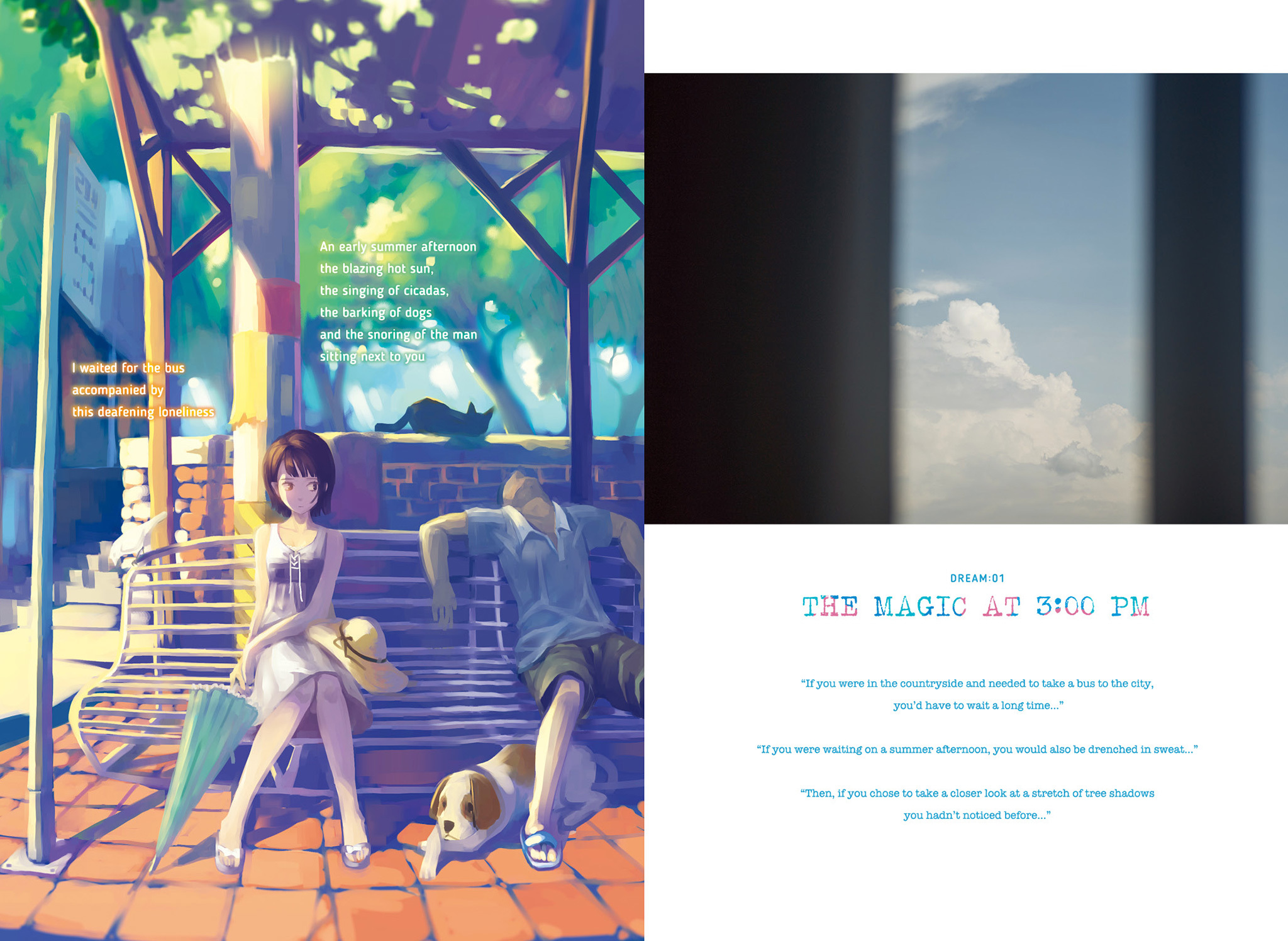 Colorful Dreams ©︎VOFAN / MAXPOWER
Colorful Dreams ©︎VOFAN / MAXPOWERIn the past, you have said that you have more confidence in your photography than in your art. However, we couldn't find any photography books you've published or exhibitions that you've done. Are these things that you've considered?
VOFAN: In terms of photography... I've taken jobs for photographing interiors before. And I also have released a photography book before, though it was self-published.
Photography and illustration seem to be very separate art forms for you. Do you ever illustrate the things you see in daily life instead of reaching for your camera? For instance, images of objects or spaces that appeal to you?
VOFAN: To me, photography is mainly about realism. Meanwhile, illustrations are more about drawing out things that I've imagined. And so, something that doesn't exist... Well, let's say I want to take a photograph of something. It's because of how real and unique that something is. I won't think of drawing it, because if I draw it, it loses that "realness."
So again, photography is about capturing reality, while drawing is about expressing the things in my mind. I think these two things are very different.
How do you think your background in architecture has affected your abilities as an artist?
VOFAN: In two ways, I think. One, it taught me how to pull all-nighters. And two, it helped me gain a good grasp on spatial visualization.
Do you think your illustrations would look a lot different now if you hadn't studied architecture at all?
VOFAN: Honestly, I don't think I was a very good architecture student. I had to force myself through it. And so I don't think architecture has had that much of an influence on my art itself. Photography, on the other hand, has had a much larger influence.
Would you consider doing a followup to "Colorful Dreams"? Perhaps from a different perspective than the one you had when you were younger?
VOFAN: I feel like... when I was working on "Colorful Dreams," it was like going through a "first love" of sorts. Like when a young boy first starts to experience romantic feelings. But now I already have three children, so naturally, the things I draw will be different. Who knows... perhaps my future work will be significantly darker? So if we come out with a sequel now, it might be filled with despair, horror, and gore. Possibly.
What are the origins of the name "VOFAN"?
VOFAN: It's from a video game. The game starts with "VO," and I'm a "fan" of the game. Hence, "VOFAN."
Though Monogatari is a series dominated by female characters, many Monogatari fans claim that the best girl of the series is actually Kaiki. In general, your illustrations are very dominated by female characters, but we've heard that you used to draw manly male characters. Could you tell us a bit more about this, and if we can look forward to more Kaikis—male characters—in the future?
VOFAN: I was just like any regular boy. When I was little, I liked robots and monsters, and then just robots in particular. Next, I started to enjoy drawing "hot-blooded" things, things involving male heroes, the kind you'd see in Shounen manga. Then, when I hit my adolescence, I started liking cute girls... and I think even when I'm 80, 90, 100 years old, cute girls will still remain my favorite thing to draw.
What were your first thoughts when you were assigned to illustrate the Monogatari series? Did you know about NISIOISIN beforehand?
VOFAN: I've always really liked anime and manga, so I'd already read NISIOISIN's work before [receiving that assignment]. The specific book I'd read is called "Kubikiri Cycle," from the Zaregoto series.
How much guidance were you given during the character design process for Monogatari?
VOFAN: The publishers provided notes telling me which characters to draw. But things like poses and backgrounds... that's for me and the editors in Taiwan to discuss and decide.
Out of all of the characters you've designed for the Monogatari franchise, which ones are you the most proud of having brought to life?
VOFAN: I think, probably... Shinobu... Mmm... Hachikuji... and Nadeko. Also... ah, that's three. Yeah, more or less those three.
There have been many manga and anime adaptations of the Monogatari series. What are your thoughts on them?
VOFAN: Different forms of media will have different audiences, and different artists will have different styles... And I think they're all great. But I usually try my best to not be influenced by them too much. Though sometimes, I might see that one of the adaptations did something better than I did. So I'll think, "yes, I could use that."
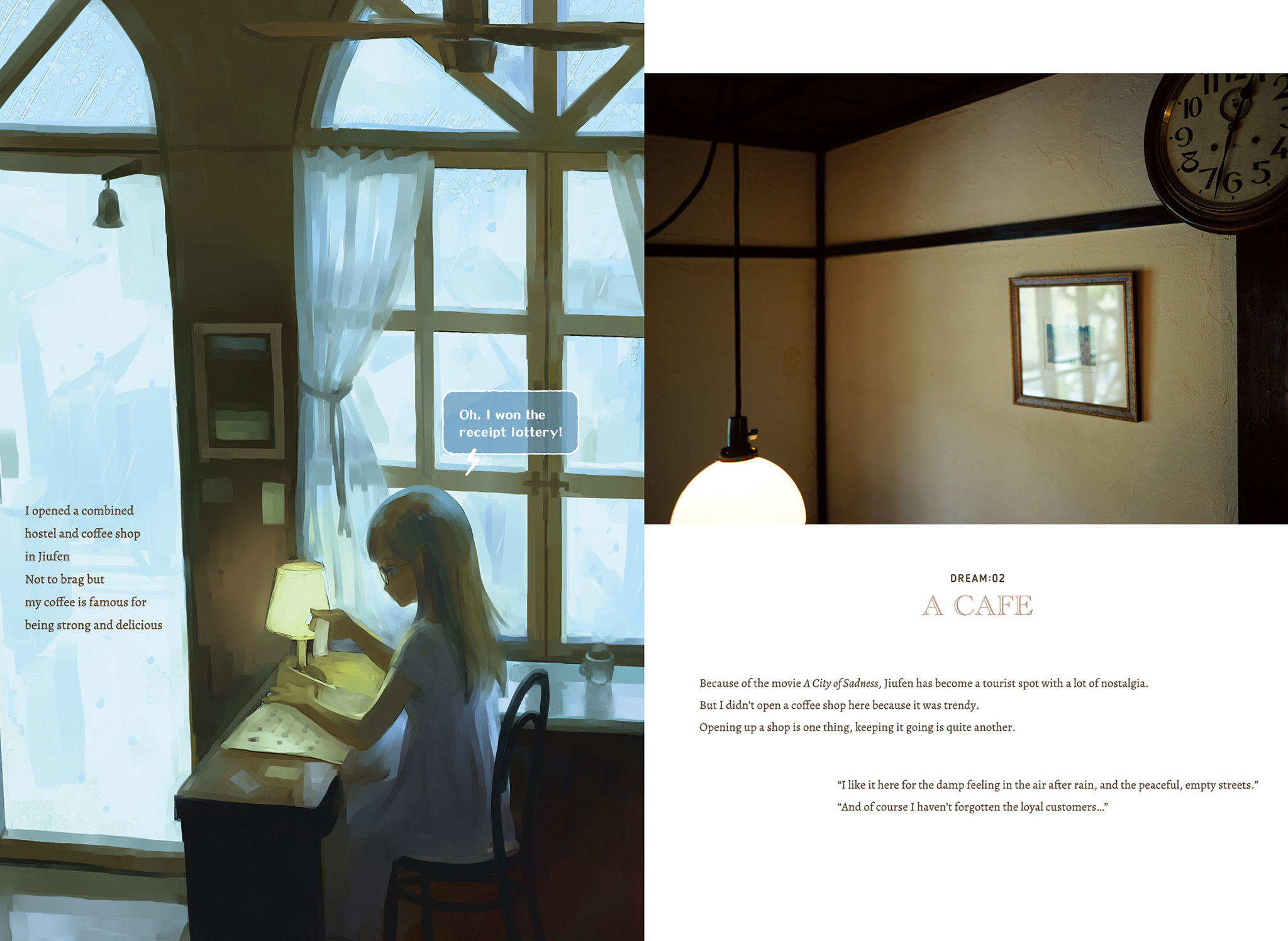
Colorful Dreams ©︎VOFAN / MAXPOWER
You've also illustrated Okitegami Kyoko, a more recent series of novels from NISIOISIN. What was your reaction to illustrating another one of his works? What are your thoughts on the work itself?
VOFAN: When this series started, it was targeted towards a different audience. He wanted to write something that girls would like to read as well. So when I was illustrating it, I tried to add in a bit more of the kinds of things that would appeal to a female audience. I would focus a bit more on the fashion aspect, or I would give the illustrations a gentler feel. It was a different approach than what I would take with a more male-oriented work.
As for my opinion of the work... I find it incredible that Nisio-sensei can write so many works with so many different styles. Sometimes, I wonder if it isn't just one person. That it might actually be an entire office of people.
Though because we've met in real life before, I do know that it's actually just one person.
Has there ever been an instance where your take on the appearance of a character has helped to evolve or change the character's portrayal later on in their story?
VOFAN: With modern light novels... I think this kind of occurrence should be pretty common. The author and artist will both affect the other. Sometimes, an author's description of a character might not be very complete. So after the artist illustrates the character, the author might think, hey, I like this, I can work this back into my writing. They end up feeding into each other. And again, I think you see this kind of situation a lot.
Though sometimes... well, for example, let's say an author writes a novel with a female character, but he never describes the character's hairstyle. And then the artist draws the character with short hair. But then the author says "oh, this character actually has long hair." And situations like that might feel like an affront to the artist, the person who drew the character.
Is there a specific genre of manga or light novels that you would love to illustrate for, but haven't yet?
VOFAN: I would really like to try something dark and gory. I've accepted projects to illustrate for culturally-steeped horror stories before, and working on those made me really happy. Because it's something completely different from what I usually do. It allows me to challenge myself, drawing art for horror, and it's very exciting.
You have been sharing your artwork online for an incredibly long time. Do you feel that social media has become a vital asset to artists?
VOFAN: I think that sharing one's work through SNS channels, Twitter and Facebook in particular, is something that all creators and artists absolutely need to do. However, if you invest too much into social media, I feel it'll start eating into the time you spend actually working on your art. And so I'll only pay attention to social media after I've finished my work, when I'm otherwise free. It's not something I spend too much time on.
Your art style has changed quite a bit over the years. How have you been able to develop and evolve your style?
VOFAN: I've just been constantly learning and improving. You need to treat yourself as a sponge of sorts. You need to constantly be thinking that you're not good enough. And you need to always be absorbing new knowledge. I feel, with my work... it always goes like this: right after I've finished drawing something, I'll feel very confident. But after I look at someone else's artwork, I'll feel very discouraged. And so it's always swinging back and forth like that, and that's how I can constantly improve.
When portraying the emotions of characters, you've mentioned listening to music to set the mood. Do you have some favorite artists or soundtracks you listen to frequently or go to specifically for certain moods?
VOFAN: I tend to listen to relatively laid-back music. Like... stuff that's relaxing, but not the kind that puts you to sleep, of course. I'll often use Spotify to play light jazz or songs that are currently popular in Taiwan.
I also prefer for the playlists I listen to to maintain a consistent atmosphere. I don't like it when my music suddenly jumps from something relaxing to something heavy or intense. Songs I listen to in order all need to have the same tone.
If you had to personify bubble tea, what would she look like?
VOFAN: So if bubble tea were a girl, huh? Hm... I think she would be a girl that gives off a fragrant, soft, and tasty feel. Something like that.
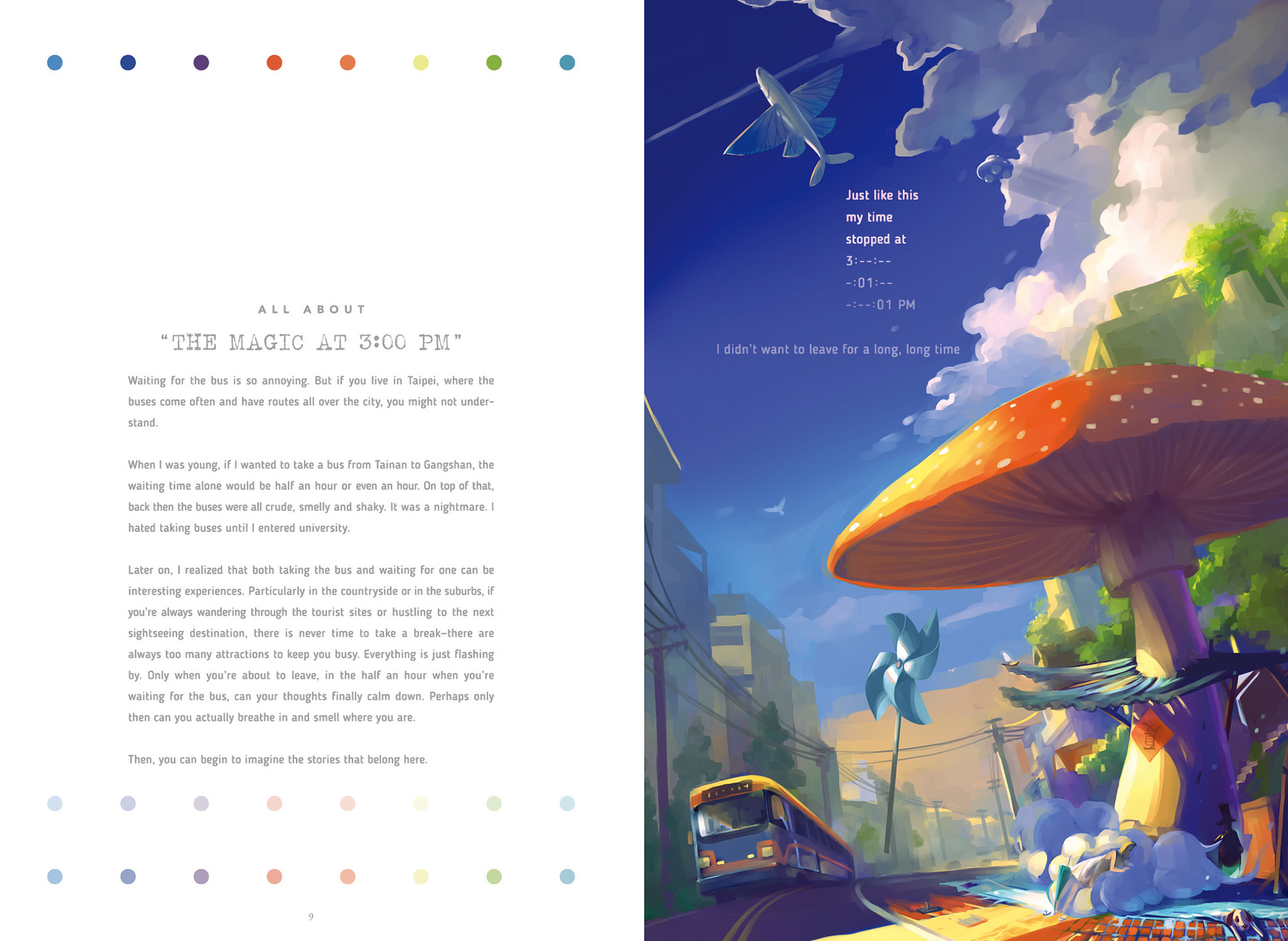 Colorful Dreams ©︎VOFAN / MAXPOWER
Colorful Dreams ©︎VOFAN / MAXPOWERYou have cited Makoto Shinkai as a major inspiration for the rendering of light in your illustrations. Which of Shinkai's films has resonated most with you, as an artist?
VOFAN: Of the movies I've seen from Makoto Shinkai... the one that left the biggest impression on me was one of his earlier works, Hoshi no Koe. I found the art to be very moving. Because even though his art wasn't quite as exquisite then as it is in his recent work, the setting and atmosphere were constructed very well. And at the time, his characters weren't especially mature or well-developed either. However, the visuals were very, very moving.
In addition, an important understanding I gained from the movie was that art doesn't need to be extremely detailed or cute. As long as it can create an ambience like the one you see in Hoshi no Koe—that's enough for it to impress, to stir up emotion within the viewer.
Well... having cute girls in your art is still a plus. Still very important.
Art is a field that is always rapidly changing. Do you feel pressure to continually improve as an artist?
VOFAN: I feel like I'm always learning new things, whether it's the newest techniques or the most popular art styles. I will go and look into all of them. That said... at the same time, I try to prevent myself from being influenced too much by these things, or my art might stop looking like it's my own. So I will slowly make adjustments over time.
What tools and programs do you use to create your art?
VOFAN: My computer or my tablet. Software-wise, I use Clip Studio Paint. I'll also use Photoshop to adjust the colors at the very end... Ah, and also to create a blurry feeling.
What's the most unusual thing you've drawn?
VOFAN: A man who was bulging with muscles. You definitely haven't seen that [specific piece of] artwork before. But he kind of looked like Super Saiyan.
How has your first time in New York City been?
VOFAN: New York gives off a certain feel, that of the old meeting the new, and I find that very interesting. The old architecture is very, very old, but the new is also very new, like it's at the very forefront of modern architectural design. And this kind of stark contrast sparks my inspiration.
As a photographer, is there anywhere in New York that you'd like to visit and shoot?
VOFAN: I would really like to go somewhere... with rundown architecture? Somewhere abandoned. But those kinds of places aren't exactly advertised to tourists, so I don't know where in New York I could find a place like that. All I know is that, for example, Detroit has a lot of abandoned factories. So something with that kind of a feel. But I don't know where in New York I could find a place with such characteristics.
That said, I actually have a great fear of being arrested by the police in America. I've run into the police a few times while taking pictures in Taiwan. But the police in Taiwan are very kind. They'll chat with me for a bit and then allow me to keep taking pictures.
Are there any places in Taiwan that have had an influence on your art?
VOFAN: In Taiwan... So, I'm from the city of Tainan, and I actually really want to draw Tainan. But you know how you might not really pay that much attention to the place where you grew up? Like, when you're somewhere else later on in life, you might be much more observant of your surroundings. And I think that's kind of a shame.
For example, I'm sure there are a lot of New Yorkers who haven't explored Broadway.
What is one place in Taiwan that you feel all tourists should visit? Why?
VOFAN: I really like Yilan, Hualien, and Taitung, the counties along the east coast of Taiwan. But unlike the west coast, where there's a high-speed rail... Well, transportation there is not as convenient. So it feels a bit like it's separated from the rest of the world. I feel like the majority of tourists who go to Taiwan all stay in Taipei. And I think that's quite a shame. They should go and check out the east coast.
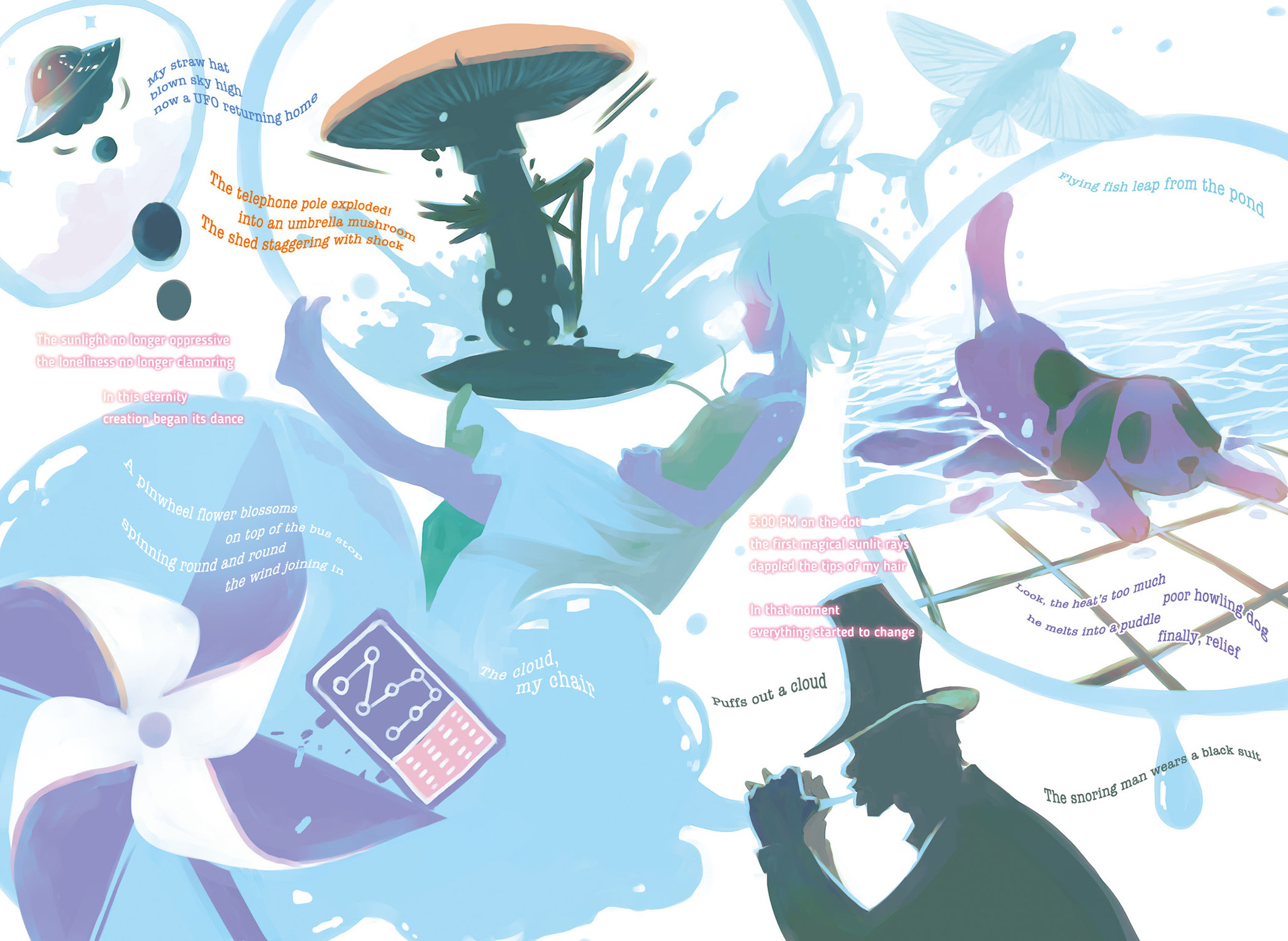 Colorful Dreams ©︎VOFAN / MAXPOWER
Colorful Dreams ©︎VOFAN / MAXPOWERIf you were to be stranded on a deserted island, which three characters that you've illustrated would you like to have by your side to keep you sane and safe until your rescue?
VOFAN: (Laughs) Oh, goodness... Hmm... Shinobu, I think. The adult version of Shinobu, the young adult version of Shinobu, and the child version. They're all very different.
As was mentioned earlier, you find Makoto Shinkai to be a great source of inspiration. Was Vertical aware of this when they contacted you to illustrate the "Hoshi no Koe" novel? Or did you reach out to them?
VOFAN: When I was working with Vertical in the past, I mentioned that I really liked Shinkai-sensei's work—
Lin-san (VOFAN's editor): They didn't know.
VOFAN: Hm?
Lin-san: They didn't know at all. It was a complete coincidence.
VOFAN: Wait, really?
Lin-san: Yeah, they really didn't know at all.
VOFAN: Oh, I see. So it should've been...
Lin-san: They didn't find out until after the fact. And when they did, they were shocked.
VOFAN: Huh. I thought this whole time that Vertical knew how much I liked Shinkai-sensei. This is my first time hearing that they didn't. I'm... very thankful that they gave me such an opportunity.
Lin-san: To explain things a bit: Vertical likes having completely original covers for their novels. And they thought that Mr. Shinkai's work was quite compatible with VOFAN's art, so they decided they would try and ask to see if VOFAN was open to something like that. And when they came and inquired about it, I said that "yes, he really likes Shinkai's work, so he'll most likely accept this project." It was a complete coincidence. A miracle, really. A miracle.
What do you think you will take away from you experience here at Anime NYC?
VOFAN: I feel like there's great value in coming to events like this. You can meet people from so many different countries, and they all have their own views on these works, views that might differ from mine or those of people from Taiwan, from Asia. And I think that's valuable, seeing so many people have so many different views on the same thing.
For example, how [he] called those two gods "monsters" earlier. I find that very interesting. Because the majority of people in Taiwan would know that those two are deities, one tall and one short. And [he] didn't know because the two cultures are completely different.
Are there any anime, manga, or light novels that have caught your attention over the last couple of years?
VOFAN: Anime-wise... I really like Gurren Lagann. And I also really like Satoshi Kon's work.
If you're allowed to say, what can we expect next from you?
VOFAN: My next work, huh? "Colorful Dreams"... with the way I currently feel, I think I'd be quite interested in doing a companion piece for it. Another thing would be if the Monogatari series were to come out with an art book. So for the time being, those two things, potentially.
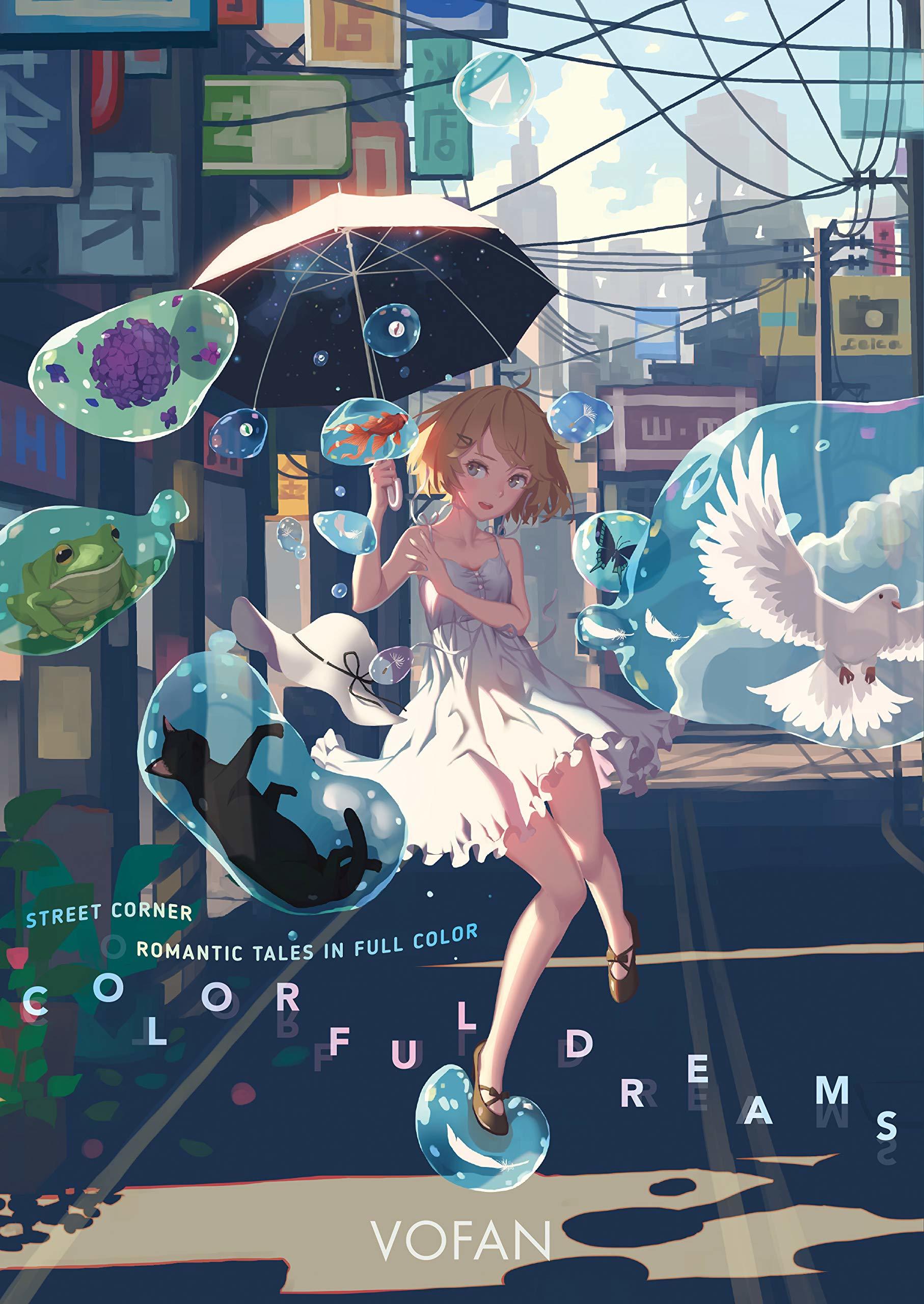 Colorful Dreams ©︎VOFAN / MAXPOWER
Colorful Dreams ©︎VOFAN / MAXPOWERInterview was conducted in Chinese. It has been translated and edited for clarity.
14 Comments Recent Comments
THE GOD!
Props for mentioning best grill Kaiki. No reaction from him though. I wonder if he was aware of that meme? Also I have no idea when this was done, but the new Higurashi project wasn't mentioned at al.
Really nice interview though. Thank you!
@Sury there was a lot of chuckling from him, his management, and interpreter when that question was asked, so he was aware of the meme I believe. What is here is his direct response to the question. And although this was a group interview so we didn't ask every question, this was indeed a question we asked! Glad you appreciated it.
Thanks for the information. Sounds like an awkwardly funny situation.
Feb 11, 2020 9:39 AM by Sury
THE GOD!
Props for mentioning best grill Kaiki. No reaction from him though. I wonder if he was aware of that meme? Also I have no idea when this was done, but the new Higurashi project wasn't mentioned at al.
Really nice interview though. Thank you!
@Sury there was a lot of chuckling from him, his management, and interpreter when that question was asked, so he was aware of the meme I believe. What is here is his direct response to the question. And although this was a group interview so we didn't ask every question, this was indeed a question we asked! Glad you appreciated it.
Feb 10, 2020 10:47 AM by ImperfectBlue
Feb 7, 2020 3:36 AM by iHazmy
VOFAN one of the greats of all time.
Feb 5, 2020 10:24 PM by Ramkec

Feb 5, 2020 8:08 PM by _Ako_
THE GOD!
Props for mentioning best grill Kaiki. No reaction from him though. I wonder if he was aware of that meme? Also I have no idea when this was done, but the new Higurashi project wasn't mentioned at al.
Really nice interview though. Thank you!
VOFAN has nothing to do with the new Higurashi. Watanabe is, the anime character designer.
Yeah, sorry, you're right. I mixed up character design and original character design there. Thanks for pointing it out.
Feb 5, 2020 4:40 PM by Sury
THE GOD!
Props for mentioning best grill Kaiki. No reaction from him though. I wonder if he was aware of that meme? Also I have no idea when this was done, but the new Higurashi project wasn't mentioned at al.
Really nice interview though. Thank you!
VOFAN has nothing to do with the new Higurashi. Watanabe is, the anime character designer.
Feb 5, 2020 4:18 PM by xile
Props for mentioning best grill Kaiki. No reaction from him though. I wonder if he was aware of that meme? Also I have no idea when this was done, but the new Higurashi project wasn't mentioned at al.
Really nice interview though. Thank you!
Feb 5, 2020 2:11 PM by Sury
Feb 5, 2020 10:53 AM by JanPri
Great interview as well, keep up the great work and thanks!
Glad to see another Gurren Lagann fan too!
Feb 5, 2020 10:46 AM by _MushiRock11_
Feb 5, 2020 10:31 AM by Slarkero
Also
Feb 5, 2020 5:25 AM by mhkr
Feb 5, 2020 4:21 AM by DKalen
Related Database Entries
| People: | VOFAN |
Search News
Related News
-
 Undead Unluck Unveiled: Let's Talk Muscles with Yoshifumi Tozuka Mar 19, 2024 3:37 PM by Kineta4 Comments
Undead Unluck Unveiled: Let's Talk Muscles with Yoshifumi Tozuka Mar 19, 2024 3:37 PM by Kineta4 Comments -
 Interview: Miku Ito Charms 'BanG Dream!' Fans at Anime NYC Feb 28, 2020 9:52 AM by ImperfectBlue13 Comments
Interview: Miku Ito Charms 'BanG Dream!' Fans at Anime NYC Feb 28, 2020 9:52 AM by ImperfectBlue13 Comments -
 Focus: Dive into the World of Webtoons with 'Omniscient Reader's Viewpoint' Aug 12, 2024 7:24 PM by tingy2 Comments
Focus: Dive into the World of Webtoons with 'Omniscient Reader's Viewpoint' Aug 12, 2024 7:24 PM by tingy2 Comments -
 Interview: Sparking Conversation with Stereo Dive Foundation Dec 27, 2022 8:00 PM by firefractal1 Comment
Interview: Sparking Conversation with Stereo Dive Foundation Dec 27, 2022 8:00 PM by firefractal1 Comment -
 Interview: From YouTube to Tensura, MindaRyn's Unique Take on Anisong Dec 23, 2022 11:00 PM by tingy1 Comment
Interview: From YouTube to Tensura, MindaRyn's Unique Take on Anisong Dec 23, 2022 11:00 PM by tingy1 Comment
MoreNew Anime
-
 Web Manga 'Ma no Mono-tachi wa Kuwadateru' Gets Anime
Web Manga 'Ma no Mono-tachi wa Kuwadateru' Gets AnimeYesterday, 4:08 PM by DatRandomDude7 Comments
-

-
 Anime Adaptation of 'Shota Oni' BL Web Manga Announced
Anime Adaptation of 'Shota Oni' BL Web Manga AnnouncedMar 23, 6:59 PM by Vindstot35 Comments
-
 Third Season of New 'Rurouni Kenshin' TV Anime Announced
Third Season of New 'Rurouni Kenshin' TV Anime AnnouncedMar 22, 10:08 AM by Nioxys7 Comments
-
 Manga 'Kore Kaite Shine' Gets TV Anime
Manga 'Kore Kaite Shine' Gets TV AnimeMar 21, 11:07 AM by DatRandomDude8 Comments
MoreSpring 2025
-
 'Apocalypse Hotel' Unveils Supporting Cast, Second Promo
'Apocalypse Hotel' Unveils Supporting Cast, Second PromoMar 22, 8:00 PM by DatRandomDude4 Comments
-

-

-

-

MoreSummer 2025
-

-

-
 New 'Jigoku Sensei Nube' TV Anime Announces Additional Cast
New 'Jigoku Sensei Nube' TV Anime Announces Additional CastMar 23, 12:06 AM by DatRandomDude0 Comment
-

-

Jan 15, 2021 11:24 AM by gabrielpavani